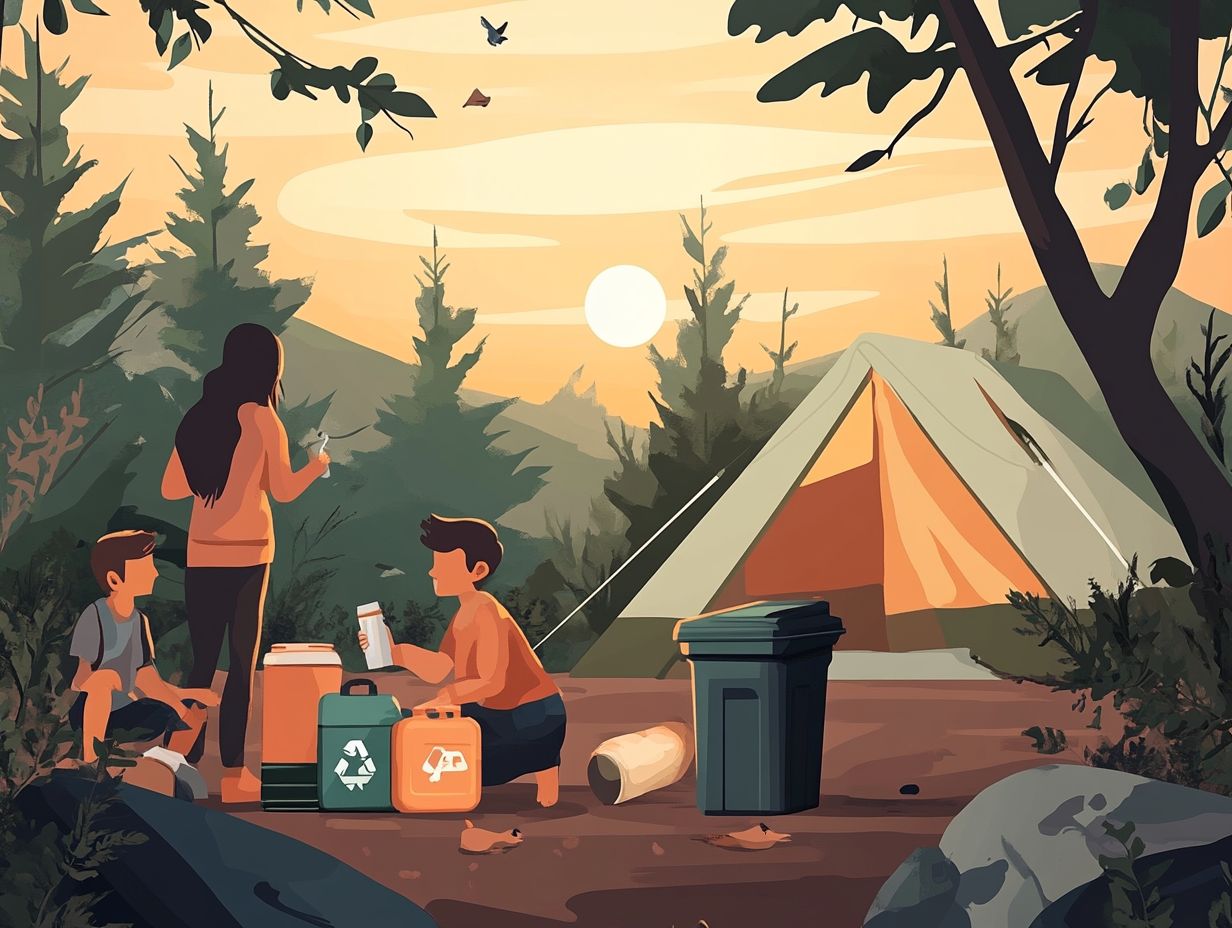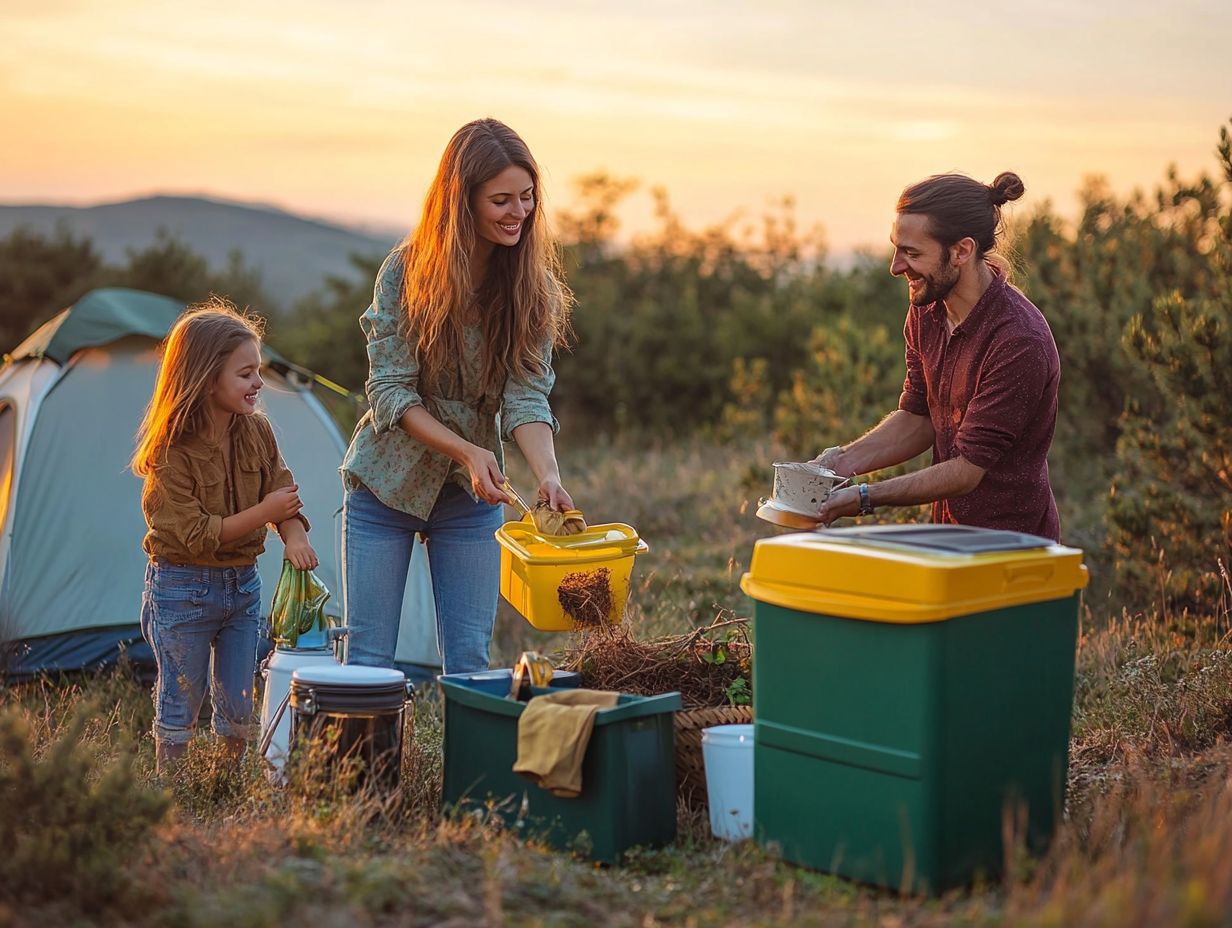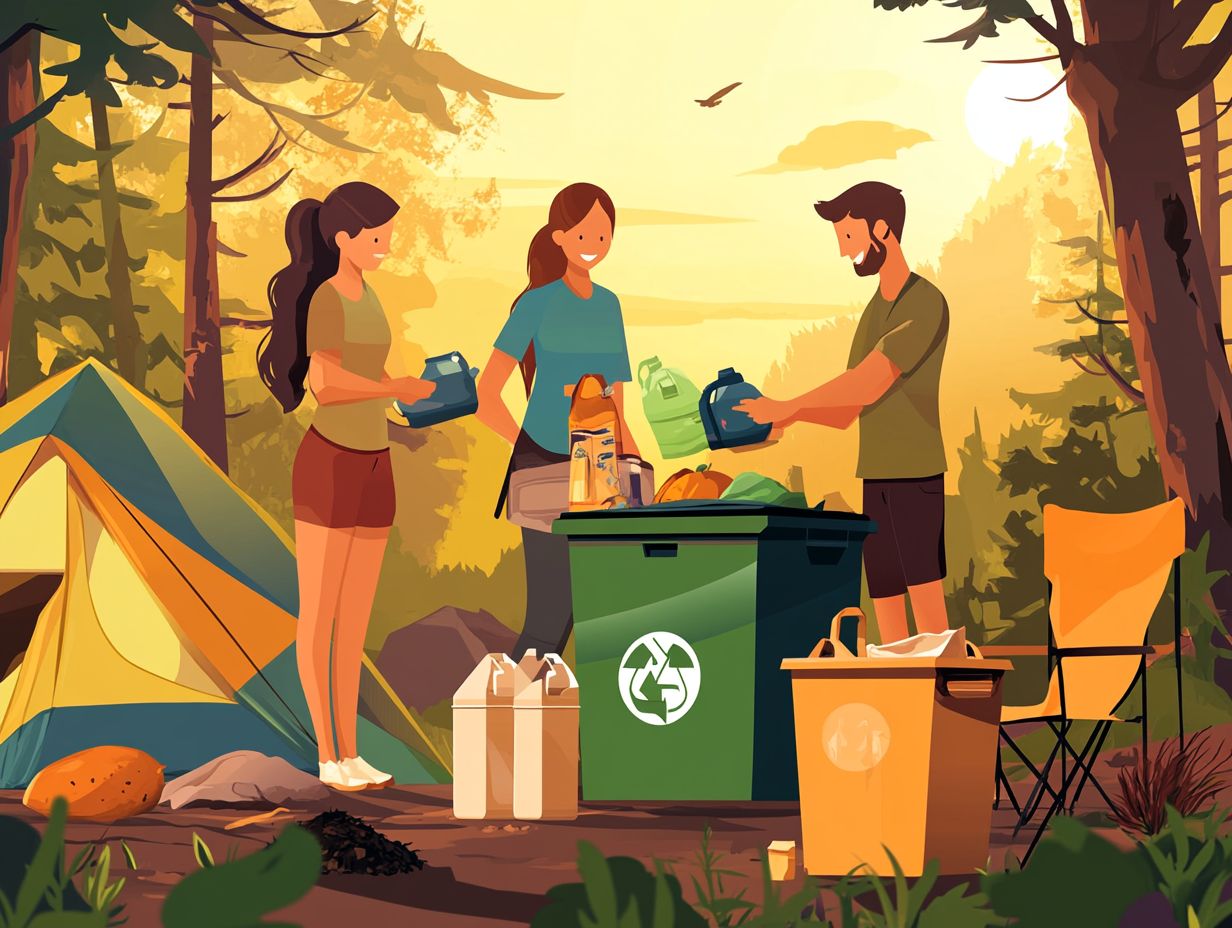10 Ways to Reduce Waste While Camping
Camping is a beloved retreat into the embrace of nature, yet it frequently carries an environmental cost. As you embark on your adventures in the great outdoors, it s essential to reflect on how your choices affect the planet.
This article outlines ten practical strategies to minimize waste while camping, covering everything from meal planning to selecting eco-friendly gear. By making intentional decisions, you can enjoy your adventures while caring for our beautiful planet!
Explore these insights to learn how you can make a meaningful impact on your next outdoor adventure!
Contents
- Key Takeaways:
- 1. Plan Meals and Pack Food Wisely
- 2. Use Reusable Containers and Utensils
- 3. Bring Biodegradable Soap and Cleaning Supplies
- 4. Use Refillable Water Bottles and Filters
- 5. Opt for Rechargeable Batteries
- 6. Choose Eco-Friendly Camping Gear
- 7. Properly Dispose of Waste and Recycle
- 8. Avoid Single-Use Items
- 9. Use Solar-Powered or Hand-Cranked Electronics
- 10. Leave No Trace Behind
- What Are the Environmental Impacts of Camping?
- Frequently Asked Questions
- What are some ways to reduce waste while camping?
- How can I reduce plastic waste while camping?
- What are some ways to minimize food waste while camping?
- How can I reduce paper waste while camping?
- What should I do with biodegradable products while camping?
- How can I involve others in waste reduction while camping?
Key Takeaways:

- Pack meals and snacks in reusable containers to minimize waste.
- Use biodegradable cleaning supplies and refillable water bottles to reduce environmental impact.
- Choose eco-friendly camping gear and properly dispose of waste to leave no trace behind.
1. Plan Meals and Pack Food Wisely
Planning your meals and packing food wisely is essential for a successful car camping trip. This approach allows you to savor delicious meals while minimizing food waste.
Not only does this enhance your overall experience, but it also promotes sustainability by utilizing eco-friendly products. Pre-prepped food items can be a game-changer, saving you time and reducing the risk of spoilage. To further manage food waste, opting for reusable containers is a brilliant choice; they keep your food fresh and are easily washable.
For energy snacks, think about including nutrient-rich options like:
- Trail mix
- Granola bars
- Camping meals
These choices are simple to pack and provide lasting energy for all your outdoor adventures. By incorporating these tips, you can fully enjoy your camping trip while respecting nature and nourishing your body.
2. Use Reusable Containers and Utensils
Using reusable containers and utensils is an essential strategy for waste reduction during your camping trips. This approach eliminates the need for disposable utensils and promotes waste-free camping ideas.
By choosing durable materials like stainless steel or silicone, you help the planet while saving money over time. Investing in high-quality stackable containers can keep your food fresh and make transport easy. Lightweight utensils made from bamboo or recycled plastic are also great options for outdoor conditions.
Careful maintenance is crucial. Packing dish soap, scrub brushes, and setting up a dedicated cleaning station can simplify your post-meal routine.
3. Bring Biodegradable Soap and Cleaning Supplies
Bringing biodegradable soap and eco-friendly cleaning supplies is vital for maintaining environmental sustainability during your camping adventure. This helps you clean your gear easily and protect the environment.
Using these products keeps your campsite pristine and minimizes your impact on local wildlife and water sources. By choosing biodegradable options, you actively contribute to the preservation of natural habitats.
Understanding how to dispose of waste properly is also crucial. Pack out all garbage, recycle whenever possible, and utilize designated waste disposal sites.
Eco-friendly cleaning supplies often come in sustainable packaging, which reduces plastic waste and fosters a greener lifestyle.
4. Use Refillable Water Bottles and Filters
Opt for refillable water bottles and water filters. This choice keeps you hydrated and combats the waste challenge posed by single-use plastics.
Embracing these sustainable practices reduces your environmental footprint. A high-quality refillable water bottle gives you hydration on the go while contributing to a cleaner planet.
When choosing a water filter, consider how much water it can clean and how easy it is to carry. The right filter elevates your outdoor experiences, ensuring you have access to fresh, safe drinking water.
This mindful approach fosters a healthier lifestyle and shows responsible stewardship of the environment through waste-free cooking.
5. Opt for Rechargeable Batteries
Switching to rechargeable batteries will supercharge your camping experience! These batteries cut down on waste and save you money over time.
You can reuse them hundreds of times before they need replacing, reducing the demand for single-use options that often end up in landfills.
Rechargeable batteries power camp lanterns and portable chargers, giving you reliable energy for your adventures. This allows you to focus on creating lasting memories in the great outdoors.
6. Choose Eco-Friendly Camping Gear

Selecting eco-friendly camping gear helps you camp sustainably, ensuring your outdoor adventures leave minimal impact on natural resources.
By choosing sustainable alternatives, like lightweight, biodegradable tents and reusable cooking supplies, you can immerse yourself in nature with a clear conscience. Opting for cookware made from recycled materials reduces waste and enhances your culinary experience under the stars.
By opting for bamboo toothbrushes and organic toiletries, you cut plastic waste and connect more deeply with nature. These eco-friendly choices contribute to preserving the beauty of natural landscapes.
7. Properly Dispose of Waste and Recycle
Dispose of waste properly and recycle while camping. This keeps our outdoor spaces clean and enhances the eco-friendly experience for everyone.
Use strong trash bags for waste and set up compost bins for organic materials to enrich the soil. This reduces landfill waste and fosters healthier ecosystems.
Recognizing the importance of recycling biodegradable packaging helps protect the beauty of nature. When you consciously separate recyclables and compostables, you play a vital role in preserving pristine landscapes for future generations.
8. Avoid Single-Use Items
Avoiding single-use items during your camping trip is a practical way to tackle the waste challenge while supporting zero-waste camping principles and favoring eco-friendly alternatives.
Instead of relying on disposable utensils that contribute to landfill overflow, consider packing reusable options like metal forks, spoons, and plates. They can be cleaned effortlessly after meals and add a touch of sophistication to your outdoor dining experience.
Opting for refillable water bottles instead of plastic bottled drinks not only cuts down on plastic waste but also helps you stay hydrated sustainably. By prioritizing these eco-friendly choices, you can minimize your environmental impact and inspire fellow campers to follow suit.
Careful meal planning helps reduce food waste, allowing you to maximize your supplies while enjoying delicious meals amidst nature s beauty.
9. Use Solar-Powered or Hand-Cranked Electronics
Incorporating solar-powered or hand-cranked electronics into your camping gear is a smart way to harness renewable energy, significantly lessening your environmental footprint while you enjoy the great outdoors.
By using solar chargers, you can effortlessly power your devices, ensuring you stay connected without draining precious battery life or relying on fossil fuels. Similarly, portable solar lights will illuminate your campsite, creating a cozy ambiance while conserving energy.
If you venture into remote areas, hand-cranked alternatives like emergency radios and lanterns provide reliable power even when the sun isn t shining. These eco-friendly gadgets not only enhance your camping experience but also support sustainable practices, allowing you to reduce waste and preserve nature’s beauty for generations to come.
10. Leave No Trace Behind
Following the Leave No Trace principles is essential for campers, promoting eco-conscious practices and ensuring that outdoor adventures don t harm the environment’s natural beauty.
These basic rules encourage you to minimize your ecological footprint while reveling in nature’s splendor. For example, opting for durable camping gear, like tents or backpacks made from recycled materials, can greatly reduce waste. Respecting wildlife helps keep animals undisturbed, and sticking to designated trails protects the flora and fauna while preventing soil erosion.
By incorporating these practices into your adventures, you actively contribute to the health and vitality of our planet’s natural spaces.
What Are the Environmental Impacts of Camping?
Camping carries a range of environmental impacts, from waste generation to resource depletion. It’s crucial to approach outdoor adventures with a commitment to sustainable practices and preserving our natural resources.
In the excitement of immersing yourself in nature, it s easy to overlook the consequences of your actions on the environment. Careless trash disposal can lead to polluted landscapes and harm local wildlife, while disturbing natural habitats risks disrupting delicate ecosystems.
Water sources can also suffer from overuse, leading to depletion and contamination, which ultimately affects both flora and fauna. By adopting sustainable camping principles, you can significantly mitigate these negative impacts.
Using biodegradable products items that break down naturally and cause less harm to the environment respecting wildlife, and following Leave No Trace guidelines are effective ways to contribute. These practices not only protect the environment but also ensure that future generations can enjoy the unspoiled beauty of nature.
How Can Campers Minimize Their Carbon Footprint?

Ready to enjoy the great outdoors while protecting our planet? Minimize your carbon footprint with these simple yet effective strategies.
Minimizing your carbon footprint is essential for engaging in eco-conscious camping, allowing you to relish outdoor adventures while safeguarding the environment for future generations.
To make a significant impact, you can adopt several practical strategies. For instance, consider eco-friendly transportation methods like carpooling with friends or utilizing public transit; these choices can greatly reduce your emissions.
Integrating renewable energy sources, such as solar panels for charging devices or using biodegradable camping gear, elevates your sustainability efforts even further. Practice waste reduction techniques by packing reusable containers and disposing of waste properly.
This way, you can enjoy the great outdoors without compromising the health of our planet.
What Are Some Eco-Friendly Camping Destinations?
Eco-friendly camping destinations are essential for you, the sustainable camping enthusiast! They offer pristine natural resources and promote outdoor adventures that align with environmentally responsible practices.
Consider places like Joshua Tree National Park in California and Acadia National Park in Maine. These locations showcase unique natural environments and breathtaking landscapes, perfect for eco-conscious travelers like you! Joshua Tree is famous for its otherworldly rock formations and vibrant desert flora, while Acadia dazzles with stunning coastal views and diverse wildlife.
Many of these parks embrace sustainable practices, implementing waste reduction initiatives and utilizing renewable energy sources to power their campgrounds. By choosing to camp at these eco-friendly sites, you not only create unforgettable memories but also play a vital role in preserving these beautiful environments for future generations, ensuring that nature thrives alongside outdoor enthusiasts.
How Can Camping Be Enjoyed Responsibly?
Enjoying camping responsibly means embracing the Leave No Trace principles a set of guidelines to help us protect nature while enjoying it and making conscious choices about waste reduction, ensuring that your outdoor adventures remain sustainable for both the environment and your fellow campers.
By planning ahead, you can significantly minimize your impact on natural habitats. This involves researching the local wildlife and understanding the regulations established by parks or camping areas to protect delicate ecosystems.
Opting for eco-friendly products like biodegradable soaps and reusable utensils further aids in preserving the beauty of the outdoors. Being mindful of your noise levels and refraining from feeding wildlife not only helps maintain the delicate balance of nature but also enhances the experience for everyone sharing the great outdoors.
Ultimately, taking a proactive approach fosters a deeper appreciation for nature and promotes responsible stewardship. This allows you to fully enjoy and protect the landscapes you cherish.
What Are the Benefits of Sustainable Camping?
The benefits of sustainable camping go far beyond just personal enjoyment; they actively promote environmental conservation and enable you to embark on outdoor adventures that leave a lighter footprint on our planet.
By embracing eco-friendly practices, you can enhance your well-being, feeling rejuvenated as you inhale fresh, clean air and reconnect with the natural rhythms surrounding you. This mindful approach deepens your appreciation for the great outdoors, instilling a profound sense of responsibility to protect these stunning landscapes.
Adopting waste reduction techniques not only helps preserve the environment but also inspires those around you to embrace sustainable habits, sparking a ripple effect that encourages entire communities to prioritize ecological health.
Ultimately, sustainable camping nourishes your spirit while safeguarding precious natural resources for generations to come. Join the movement towards sustainable camping today and make a difference!
How Can Campers Educate Others About Reducing Waste While Camping?
Educating others about reducing waste while camping is crucial for cultivating a community of eco-conscious campers dedicated to preserving the environment and embracing outdoor adventures responsibly.
By sharing practical tips on minimizing waste like packing reusable containers, opting for biodegradable products, and being mindful of food portions, you can actively contribute to a greener environment. Consider implementing these 5 ways to reduce plastic waste while traveling. Leading by example, whether it’s demonstrating proper waste disposal methods or showcasing efficient packing techniques, inspires your peers and establishes a culture of responsibility.
Engaging in initiatives like organizing clean-up hikes or hosting workshops on sustainable camping practices effectively promotes guidelines to protect nature. This approach makes your camping adventures even more enjoyable!
Frequently Asked Questions
What are some ways to reduce waste while camping?

- Use reusable containers and utensils instead of single-use items.
- Plan meals and buy only the necessary amount of food to avoid excess waste.
- Bring a water filter or purification tablets to avoid buying bottled water.
- Opt for biodegradable or compostable toiletries and cleaning products.
- Pack a trash bag and always properly dispose of waste, including biodegradable items.
- Use natural resources, such as fallen branches, for campfires instead of buying firewood wrapped in plastic.
How can I reduce plastic waste while camping?
- Avoid single-use plastic items, such as disposable plates and cutlery.
- Bring refillable water bottles and containers instead of buying bottled beverages.
- Use beeswax wraps or reusable silicone bags for food storage instead of plastic wrap or bags.
- Choose eco-friendly camping gear, such as tents and sleeping bags made from sustainable materials.
What are some ways to minimize food waste while camping?
- Plan meals and snacks ahead of time to avoid buying too much food.
- Reuse leftovers for future meals or snacks.
- Use non-perishable items, such as canned goods, for meals instead of buying fresh produce that may go to waste.
- Properly store food in airtight containers to avoid spoilage.
How can I reduce paper waste while camping?
- Use a handkerchief or cloth towel instead of disposable paper towels.
- Bring a portable bidet or use natural materials, such as leaves, for cleaning after using the restroom.
- Bring a notebook or use a note-taking app instead of using paper for lists or journaling.
What should I do with biodegradable products while camping?
- Properly dispose of it in designated waste receptacles or bury it in a hole at least 200 feet away from water sources and campsites.
- Avoid burning biodegradable waste as it can release harmful toxins into the air.
- Consider composting biodegradable waste if possible.
How can I involve others in waste reduction while camping?
- Set a good example by following eco-friendly practices yourself.
- Educate others on the importance of reducing waste and the impact it has on the environment.
- Encourage friends and family to bring their own reusable items and explain the benefits of doing so.
- Participate in clean-up initiatives and encourage others to do the same.
Start planning your eco-friendly camping trip today!






